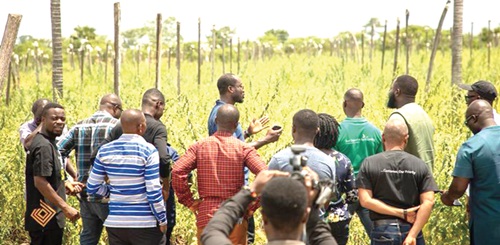Ghana Incentive-Based Risk Sharing System for Agricultural Lending (GIRSAL) has begun a sesame cultivation trial in Keyeme-Ziope in the Volta Region in a bid to unlock the crop’s full commercial and export potential.
The trial is to test the agronomic activities, yield, cost and challenges associated with sesame seed production in the country.
With a target to export $500 million worth of sesame seeds annually to the international market within three years, GIRSAL is expected to develop protocols and business cases to support agribusinesses that produce the seed for export while facilitating access to capital for them.
While the crop has been traditionally dominated by producers in countries like Sudan, Nigeria and Burkina Faso, Ghana has seen growing interest in sesame cultivation, particularly across the middle belt and northern regions.
Despite earning $12.46 million in export revenue in 2016, Ghana’s sesame export volumes drastically declined to 510.86 metric tonnes, representing $ 278,900 in 2023, due to limited production data, technical capacity and policy support.
Visit
The Chief Operating Officer, GIRSAL, Samuel Yeboah, who led a team to the project site last Friday, explained that the initiative was part of GIRSAL’s five-year strategy to develop essential commodities, starting with chilli peppers and now sesame seeds.
As part of a broader strategy, GIRSAL sought to develop the value chains for various crops, including maize and soya, which Ghana currently produces on a non-commercial level.
The first phase of the project, he said, was targeted at producing sesame seeds on 10 acres of land, with plans to scale up to 200 acres and eventually 50,000 acres.
After a successful trial, he said his outfit would create professional templates for agribusinesses to produce these crops in economic quantities.
The COO said although Ghana had the land, the labour and capability to produce sesame seeds was capturing less than one per cent of the global market for the seeds while neighbouring Nigeria managed only 3.6 per cent.
Position
With the initiative, he said, GIRSAL was aimed at positioning Ghana as a significant player in the global sesame seed market, targeting major markets such as America, Japan, Turkey and China.
“The insights from this trial would help local businesses understand how to cultivate sesame economically, and if successful, this initiative could stimulate lending from banks and unlock vital funding for agribusinesses,” he added.
“We are developing templates and protocols for businesses to follow,” he said, reinforcing GIRSAL’s commitment to supporting local farmers.
Mr Yeboah said beyond sesame, his outfit was also working to tap into the potential of other staple crops, such as maize and soybeans.
Our strategy is comprehensive,” he explained, indicating that GIRSAL was not just focusing on sesame but also planning to enhance the production of other essential commodities.

